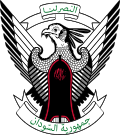Al-Haj Adam Youssef | |
|---|---|
 | |
| Second Vice President of Sudan | |
| In office September 13, 2011 –December 7, 2013 | |
| President | Omar al-Bashir |
| Preceded by | Ali Osman Taha |
| Succeeded by | Hassabu Mohamed Abdalrahman |
| Personal details | |
| Born | 1955 (age 69–70) Id al-Firsasn,South Darfur,Sudan |
| Political party | National Congress Party (Sudan) |
| Alma mater | University of Khartoum,Newcastle University |
Al-Haj Adam Youssef was the Second Vice President of Sudan from September 13,2011 to December 7,2013. [1] [2]
